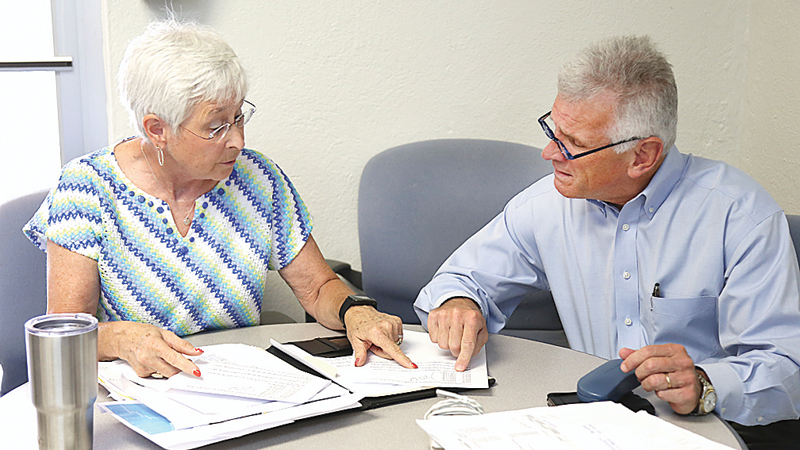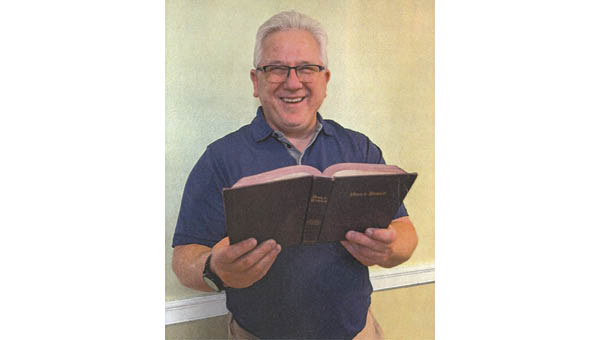Commissioners respond to Mayor’s comments on budget, veto
Published 3:17 pm Thursday, July 19, 2018

- Star Photo/Abby Morris-Frye Budget Committee Chairwoman Sonja Culler, left, and Commission Chairman Dr. Robert Acuff, at right, review county budget documents.
Several members of the Carter County Commission held a joint press conference Thursday morning to address the impending veto of the county’s budget along with remarks made by Carter County Mayor Leon Humphrey when he announced his intention to veto.
During a meeting that lasted more than 7 hours on Monday night, members of the Commission voted to approve a budget for the 2018-19 fiscal year that included an 11-cent property tax rate increase — 9 cents to balance the budget and 2 cents to be dedicated for employee raises.
Trending
On Wednesday morning, Humphrey held a press conference at the courthouse to announce his intent to veto the budget. Humphrey said he based his decision to veto the budget and tax rate on financial numbers he obtained from the Tennessee Comptroller’s Office and his belief that a tax increase is “totally unwarranted and totally uncalled for.”
According to Humphrey, Carter County currently has sufficient money available in the fund balance reserve to cover the expenditures for the year without raising property taxes.
Leading up to the budget vote on Monday, Humphrey said the Budget Committee and other commissioners had circulated a lot of misleading and incorrect information that the county had a financial deficit in funding that was growing. According to Humphrey, there is no deficit in funding.
Following Humphrey’s press conference, Commissioner Dr. Robert Acuff, who serves as chair of the County Commission, spoke with Budget Committee Chairwoman Sonja Culler and decided to hold a press conference of their own to address some of the statements made by Humphrey in his announcement. Joining Acuff and Culler at the announcement were fellow Budget Committee members Ross Garland, Isaiah Grindstaff, and Al Meehan. All of those Budget Committee members voted in committee to approve the budget that was presented to the full Commission. Also joining the Budget Committee members were Commissioner Brad Johnson, who serves as Vice Chairman of the Commission, Financial Management Committee Chairman Danny Ward, and Commissioner Willie Campbell.
Members of the Budget Committee spoke in support of the budget they proposed, citing their belief that the county needed to balance the budget without dipping into the fund balance reserve as it has done in years past. Culler said the county was also faced with increased expenditures due to rising costs of everything from office supplies to health insurance.
“We have had a deficit in the last couple of years,” Culler said. “Just as all of your items are going up in the grocery stores and in department stores, everything the courthouse uses has gone up as well.”
Trending
Acuff also addressed remarks by Humphrey using figures from the Comptroller’s Office showing the county’s fund balance reserve has grown in recent years. At the start of the 2017-18 fiscal year, the county had around $8 Million in the fund balance, Acuff said. Because the Finance Department is still in the process of closing out and reconciling records for the ‘17-18 fiscal year the final fund balance number is not currently available for the year, but Acuff said Finance Director Brad Burke has estimated it will come in between $7 Million and $8 Million.
According to Acuff, the county needs to maintain a healthy fund balance as part of sound financial operations.
“We want to make sure we have a stable fund balance so we can meet any emergencies that arise,” Acuff said. “We don’t want to continue to rob from ourselves in order to meet budget.”
At the current levels, Acuff said the fund balance contains roughly 50 percent of the county’s General Fund expenditures, which covers day-to-day operations of county departments aside from the Highway Department, school system, and the county’s debt service payments.
According to Culler, in the past few years the county has budgeted at a deficit, meaning during the budget process expenditures were estimated as being higher than the incoming revenue. In order to balance those budgets, the Commission voted to take the additional needed funds from the fund balance.
“We have had a deficit in the last couple of years and that is what we are trying to replace so we do have a healthy fund balance in case we do have an emergency in this county,” Culler said. “It is a necessary thing to have a tax increase.”
The county’s fund balance numbers are in constant fluctuation, according to Acuff, and the numbers presented by Humphrey represent a snapshot in time by the Comptroller when looking back over a fiscal year that has been closed out.
“There is fluctuation in the fund balance,” Acuff.
“We may start off at $8 Million, but we don’t stay there.”
“Those are invested and they run this county throughout the year. You only collect taxes for a certain period from October to February.”
According to Acuff, because the fiscal year begins on July 1 and tax payments don’t begin coming in until October, the county must operate off of its fund balance until that revenue begins flowing.
Acuff said he has discussed the budget issues at length with Finance Director Brad Burke, whom Acuff described as being very knowledgeable about the county’s budget despite being new to the Finance Director position. Prior to accepting the position of Finance Director, Burke worked for the Tennessee Comptroller’s Office as an auditor.
“He probably knows this county better than anybody here because when he worked for the Comptroller’s Office he audited this county, amongst other counties in the area, for over 15 years. He knows us very well,” Acuff said. “He said our fund balance is very conservative.”
Meehan spoke to the group about an aspect of the budget process he feels needs to be considered, particularly with Monday’s Commission meeting lasting for more than seven hours.
“There was an elephant in the room beside the tax issue, and that was the election,” Meehan said. “I’m not saying everyone voted because of that, but I feel a number of commissioners were hesitant to go on record as having raised taxes in Carter County because in 14 days they could or could not be voted back into office.”
Culler also addressed the potential political issues surrounding the budget.
“Yes, it is an election year. And if people would really think about it, why would commissioners want to raise taxes for their own benefit during an election year,” Culler said. “This is a necessary thing to take care of all the people in the courthouse and take care of all of our departments.”
While raising taxes may not be a popular move politically, Culler said she feels politics are playing a role in the budget.
“The Mayor only vetoes the tax rate when it’s an election year,” Culler said, adding Humphrey also vetoed the budget in 2014, which was the previous election cycle for county offices.
Acuff also addressed the Mayor’s decision to present his numbers from the Comptroller’s Office after the budget was passed instead of presenting the information to the Budget Committee or the full Commission.
“I would challenge the Mayor, obviously he could have done this same dog and pony show at the Commission meeting Monday night,” Acuff said. “This is obviously something he was thinking about because he made it very clear to the Budget Committee and the Commission that he intended to veto any budget that included a tax increase.”






